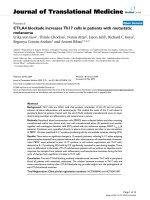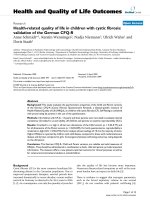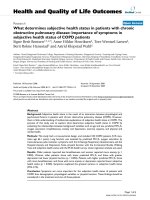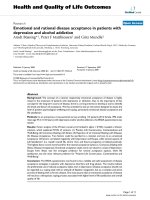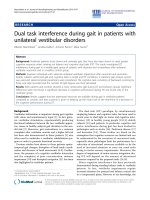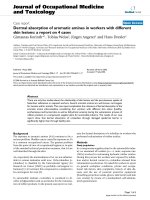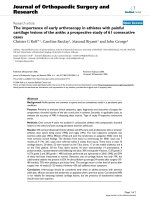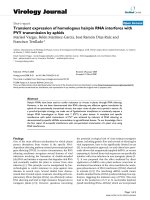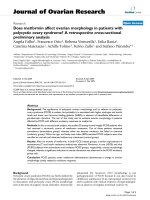báo cáo hóa học: "Emotional and rational disease acceptance in patients with depression and alcohol addiction" doc
Bạn đang xem bản rút gọn của tài liệu. Xem và tải ngay bản đầy đủ của tài liệu tại đây (255.7 KB, 11 trang )
BioMed Central
Page 1 of 11
(page number not for citation purposes)
Health and Quality of Life Outcomes
Open Access
Research
Emotional and rational disease acceptance in patients with
depression and alcohol addiction
Arndt Büssing*
1
, Peter F Matthiessen
1
and Götz Mundle
2
Address:
1
Chair of Medical Theory and Complementary Medicine, University Witten/Herdecke, Gerhard-Kienle-Weg 4, 58313 Herdecke, Germany
and
2
Oberberg Klinik Schwarzwald, Oberberg 1, 78132 Hornberg, Germany
Email: Arndt Büssing* - ; Peter F Matthiessen - ;
Götz Mundle -
* Corresponding author
Abstract
Background: The concept of a rational respectively emotional acceptance of disease is highly
valued in the treatment of patients with depression or addiction. Due to the importance of this
concept for the long-term course of disease, there is a strong interest to develop a tool to identify
the levels and factors of acceptance. We thus intended to test an instrument designed to assess the
level of positive psychological wellbeing and coping, particularly emotional disease acceptance and
life satisfaction
Methods: In an anonymous cross-sectional survey enrolling 115 patients (51% female, 49% male;
mean age 47.6 ± 10.0 years) with depression and/or alcohol addiction, the ERDA questionnaire was
tested.
Results: Factor analysis of the 29-item construct (Cronbach's alpha = 0.933) revealed a 4-factor
solution, which explained 59.4% of variance: (1) Positive Life Construction, Contentedness and
Well-Being; (2) Conscious Dealing with Illness; (3) Rejection of an Irrational Dealing with Disease;
(4) Disease Acceptance. Two factors could be ascribed to a rational, and two to an emotional
acceptance. All factors correlated negatively with Depression and Escape, while several aspects of
Life Satisfaction" (i.e. myself, overall life, where I live, and future prospects) correlated positively.
The highest factor scores were found for the rational acceptance styles (i.e. Conscious Dealing with
Illness; Disease Acceptance). Emotional acceptance styles were not valued in a state of depression.
Escape from illness was the strongest predictor for several acceptance aspects, while life
satisfaction was the most relevant predictor for "Positive Life Construction, Contentedness and
Well-Being".
Conclusion: The ERDA questionnaire was found to be a reliable and valid assessment of disease
acceptance strategies in patients with depressive disorders and drug abuses. The results indicate
the preferential use of rational acceptance styles even in depression. Disease acceptance should not
be regarded as a coping style with an attitude of fatalistic resignation, but as a complex and active
process of dealing with a chronic disease. One may assume that an emotional acceptance of disease
will result in a therapeutic coping process associated with higher level of life satisfaction and overall
quality of life.
Published: 21 January 2008
Health and Quality of Life Outcomes 2008, 6:4 doi:10.1186/1477-7525-6-4
Received: 17 September 2007
Accepted: 21 January 2008
This article is available from: />© 2008 Büssing et al; licensee BioMed Central Ltd.
This is an Open Access article distributed under the terms of the Creative Commons Attribution License ( />),
which permits unrestricted use, distribution, and reproduction in any medium, provided the original work is properly cited.
Health and Quality of Life Outcomes 2008, 6:4 />Page 2 of 11
(page number not for citation purposes)
Background
Among the numerous ways to cope with disease, two gen-
eral strategies can be distinguished: 1. problem-solving
(i.e. do something active to avoid stressful circumstances)
and 2. emotion-focused coping strategies (i.e. try to regu-
late the emotional consequences of stressful or potentially
stressful events). Folkman and Lazarus [1] found that
both types are used to face stressful situations. In contrast,
Carver et al. [2] found 15 factors that reflect active versus
avoidant coping strategies, among them "Resignation/
Acceptance" (accepting the fact that the stressful event has
occurred and is real) and "Focus on and Venting of Emo-
tions" (increased awareness of one's emotional distress,
and concomitant tendency to ventilate or discharge those
feelings).
An active coping means to change the nature of the stres-
sor itself or how one thinks about it. In contrast, avoidant
strategies are intended to prevent a direct confrontation
with the stressful events, and may often result in inappro-
priate activities such as alcohol abuse or depressive states.
These avoidance strategies were identified as psychologi-
cal risk factors or marker for adverse responses to stressful
life events [3]. Data from depressed patients showed that
a better clinical course of depression was associated with
patients who had high levels of social support, had more
active and less avoidant coping styles, and who were phys-
ically active [4]. Lung transplant candidates most likely
use active, acceptance, and support-seeking strategies to
cope with health problems, while self-blame or avoidance
were rarely used [5]; however, the avoidant coping was the
most strongly and consistently related to quality of life.
Evers et al. [6] proposed three generic illness cognitions
that reflect different ways of re-evaluating the inherently
aversive character of chronic disease: 1. helplessness as a
way of emphasizing the aversive meaning of disease, 2.
acceptance as a way to diminish the aversive meaning, and
3. perceived benefits as a way of adding a positive mean-
ing to the disease. However, according to Carver's concep-
tualizations [2], disease acceptance has often a
connotation of resignation and fatalism. In fact, in
patients with rheumatoid arthritis, illness acceptance
beliefs were identified as significant predictors of both
anxiety and depression [7].
Among several psychosocial factors associated with
depression and/or stress resilience [8], one may find pos-
itive emotions and optimism, cognitive flexibility, cogni-
tive explanatory style and reappraisal, acceptance, and
religion/spirituality. Intensive research during the last
decades has brought a shift from a somatic determined
acceptance of disease and disorders to a more psycholog-
ical perspective. In fact, most chronic diseases are influ-
enced by somatic, psychological, social, and spiritual
factors, and thus an exclusive focus on the somatic or
solely the psychological aspects is a short-cut rather than
a comprehensive approach which acknowledges the
multi-factorial aetiology of chronic disease and the com-
plex process-oriented therapeutic approaches. Education
and training help patients to develop living patterns that
incorporate self-management. According to this informa-
tive strategy, the patients learn about causes and sources,
and what to focus on and what to ignore. This is a cogni-
tive (rational) based strategy to deal with chronic illness.
Although education and self-management are significant
aspects of treatment, however, several patients with
depression or addiction experience recurrent failure
despite of this knowledge. To achieve a long-lasting and
thus effective treatment, the emotional acceptance of dis-
ease with handling of feelings of anger, guilt or escape and
integration of the disease as a permanent 'note' into the
self-concept, is of out-standing importance. In fact, in out-
patients with schizophrenia, Cooke et al. [9] demon-
strated that "awareness of symptoms and problems" cor-
related with greater distress, while "preference for positive
reinterpretation and growth" was associated with lower
distress and symptom awareness (re-labelling), and
"social support-seeking" with greater awareness of illness,
but not distress [9].
In the Oberberg Concept, which was developed by Profes-
sor Matthias Gottschaldt in the early 1980s [10-12], the
concept of a rational and emotional acceptance of the dis-
ease is highly valued in the treatment of patients with
depression or addiction. The 'Oberberg Concept' postu-
lates, that the rational and especially the emotional
acceptance are important coping strategies to prevent
relapse. Unaware emotional non-acceptance of the dis-
ease by the patient, such as denial, guilt, fighting against
or escape of the disease, are believed to be significant risk
factors for relapse even if the patient is able to accept his
disease rationally. At the beginning of the therapeutic
process, the patient is often unaware of his dysfunctional
emotional coping strategies. At this initial stage, the
patient feels unconsciously angry and defensive, as well as
guilty or shameful for the development of the disease.
According to the 'Oberberg Concept'[10-12], one has to
focus on recognizing these individual dysfunctional emo-
tional coping strategies. Through daily individual and
group therapy sessions, the patient mindfully learns to
recognize his functional and dysfunctional emotional
coping strategies and their origins. These origins are most
often a combination of current conflicts and imprints of
childhood memories, which are mainly unconscious. If
the disease is emotionally accepted, the patient is able to
see his disease as a medical condition and not as a per-
sonal failure, and thus will be able to accept the necessary
current and future treatment as well as learning how to
adequately deal with difficulties caused by the disease. If
Health and Quality of Life Outcomes 2008, 6:4 />Page 3 of 11
(page number not for citation purposes)
the patient still fights emotionally against the disease,
early warning symptoms of a relapse will not be recog-
nized and necessary treatment will not be chosen even if
the patient knows rationally all treatment options.
Due to the importance of the rational and emotional
acceptance upon the treatment and long-term course of
the disease, there is a strong interest to develop a tool to
identify the levels and factors of acceptance. The intention
of this work was thus to develop and test a new instru-
ment designed to assess the level of positive psychological
wellbeing and coping, particularly emotional disease
acceptance and life satisfaction, in patients with depres-
sive s and addictive behaviour pattern.
Methods
Procedure and subjects
All individuals of this cross-sectional anonymous survey
were informed of the purpose of the study, were assured
of confidentiality, and gave informed consent to partici-
pate. The patients were recruited consecutively in three
German clinics, i.e. Oberberg Clinics Schwarzwald,
Weserbergland, and Berlin/Brandenburg. The private spe-
cialist emergency clinics within the Oberberg group offer
comprehensive medical and psychotherapeutic treatment
for individuals suffering from emotional, psychosomatic
and psychiatric problems, such as addictive behaviour
patterns, depression, and burn-out.
All subjects completed the anonymized questionnaire,
which did not ask for name or for initials, by themselves.
Moreover, all anonymous questionnaires were stored 470
km away from the clinics at the University Witten/
Herdecke, and were transferred into an electronic data
pool. A later allocation of the data to concrete patients is
thus impossible.
The sample of this cross-sectional survey contained 115
patients (51% female, 49% male) with a mean age of 47.6
± 10.0 years. 49% had a depression (or associated dis-
eases, i.e. burn out, anxiety disorders), 24% alcohol addic-
tion (just 3 patients with others addictions), 12%
depression and addiction, and 16% diseases which were
within the unique therapeutic context of the respective
clinics, i.e. addictive behaviour patterns, depression, and
burn-out, but not specified by the patients.
Although depression and alcohol abuse are separate but
often co-morbid disorders with different aetiologies, tra-
jectories and consequences, the therapeutic concepts of
the Clinics nevertheless focus on emotional disease
acceptance as an integral aspect of an active therapeutic
process. One may suggest that several of them have used
avoidance strategies in their past.
Most of the patients were married (45%), 14% were living
with a partner not married with, 17% were divorced, 23%
living alone, and 1% widowed. Sixty-four% had a high
school education (Gymnasium), 19% a secondary educa-
tion (junior high; Realschule), 4% a secondary education
(Hauptschule), and 13% other. Most of them had a Chris-
tian affiliation (68%), 31% none, and 1% other. Fifty-
five% were employees, 26% self-employed, 6% house
wives/men, 4% unemployed, 9% in early retirement, and
2% incapacitated. With respect to these variables, no sig-
nificant differences were found between the disease
groups (data not shown).
As shown in table 1, the disease groups did significantly
differ in terms of depression index, Escape, life satisfac-
tion and attendance of a support group, while for age and
mean duration of disease just a remarkable trend was
observed. In fact, patients with depression and related dis-
eases of course had a higher depression index, Escape and
lower life-satisfaction, while patients with addictions of
course attended support groups more frequently, had a
longer duration of disease, were older, and, however, had
a higher life-satisfaction.
Measures
The items of the ERDA (acronym of "Emotional/Rational
Disease Acceptance") questionnaire were developed with
the input of patients and experts, particularly statements
of psychiatrists, psychologists, and other therapists from
the Oberberg clinics. On the basis of the expertise of the
three heads of the Oberberg clinics, 48 items were chosen
among a sample of several others suggested to address the
underlying concept of an emotional respectively rational
disease acceptance.
All items were scored on a 5-point scale from disagree-
ment to agreement (0 – does not apply at all; 1 – does not
truly apply; 2 – don't know; 3 – applies quite a bit; 4 –
applies very much). Some items were recoded because of
an intended negative direction (indicated in table 2 with
"-"). The final scores were referred to a 100% level (4
"applied very much" = 100%).
For external correlations, we used the Beck-Depression-
Index (BDI), the Escape scale (Büssing et al., 2006) which
measures an attitude of depressive escape from illness
("fear what illness will bring", "would like to run away
from illness", "when I wake up, I don't know how to face
the day"); moreover, the AKU questionnaire which meas-
ures six different adaptive coping styles [13,14], the Brief
Multidimensional Life Satisfaction Scale according to
Huebner [15] with two additional items, and Meaning of
Illness according to Lipowski [16,17].
Health and Quality of Life Outcomes 2008, 6:4 />Page 4 of 11
(page number not for citation purposes)
Statistical analysis
Reliability and factor analyses of the inventory were per-
formed according to the standard procedures as described
previously [17]. To combine several items with similar
content, we relied on the technique of factor analysis
which examines the correlations among a set of variables,
and to achieve a set of more general "factors". Factor anal-
yses (extraction of main components with eigenvalues >
1) were repeated rotating different numbers of items (Var-
imax rotation with Kaiser Normalization) in order to
arrive at the solution which demonstrates both the most
simple and the most coherent structure.
All reliability and factor analyses, analyses of variance
(ANOVA), correlation analyses, and tests of between-sub-
jects effects were performed with SPSS for Windows 12.0.
We judged p < 0.05 significant, and 0.05 < p < 0.10 as a
trend.
Results
Reliability
In order to eliminate items from the 48-item pool that
were not contributing to the questionnaire reliability,
items which were too complicated in the phrasing or with
a poor reliability (<0.2) had to be removed, among them
3 items which would make up a scale termed "Apprecia-
tion and Gratitude". As shown in table 2, the resulting 29-
item construct had a good quality (Cronbach's alpha =
0.933). The item difficulty (2.38 [mean value]/4) was
0.60. With the exception of item K35 (0.81) and item K33
(0.84) which tended to have a ceiling effect, all values
were in the acceptable range from 0.2 to 0.8.
Factor analysis
Factor analysis of the questionnaire revealed a Kaiser-
Mayer-Olkin value of 0.840, which as a measure for the
degree of common variance, indicates that the item-pool
is suitable for a factorial validation.
Primary factor analysis pointed to a 6-factor solution (all
with initial eigenvalues > 1), which would explain 67.4%
of variance: a 6-item sub-scale "Arrangement with Symp-
toms and Positive Life Construction"; a 6-item sub-scale
"Conscious Dealing with Illness"; a 7-item sub-scale
"Dealing with Irrational Disease Rejection"; a 5-item sub-
scale "Contentedness and Well-Being (despite of Dis-
ease)"; a 3-item sub-scale "Rational Disease Acceptance";
and a 4-item sub-scale "Emotional Disease Rejection".
Due to the fact that the tentative factors 5 and 6 consist of
just 3 or 4 items, we favoured a 4-factor solution, which
explains 59.4% of variance (Table 2): The strongest factor
with an eigenvalue of 10.4, termed "Positive Life Con-
struction, Contentedness and Well-Being" is made up by
11 items of the former factors 1 and 4, and had an alpha
of 0.921. The 6-item sub-scale "Conscious Dealing with
Table 1: Demographic and psychological data of 115 patients
All patients depression alcohol
addiction
addiction and
depression
unspecified
diseases
p-value
1
Number 115 55 25 14 17
Gender n.s
female (%) 51 60 44 36 47
male (%) 49 40 56 64 53
Mean age (years) 47.6 ± 10.0 45.1 ± 11.0 51.4 ± 8.8 48.7 ± 10.0 48.8 ± 6.8 0.054
Mean duration of disease (months) 46.1 ± 64.1 33.8 ± 52.0 54.1 ± 69.9 83.9 ± 86.5 / 0.073
Beck Depression Index 14.5 ± 10.5 18.4 ± 10.8 8.6 ± 8.0 12.9 ± 7.1 12.2 ± 7.1 0.001
Escape Score
2
47.0 ± 27.4 58.4 ± 19.6 37.0 ± 23.3 45.8 ± 28.4 39.8 ± 30.1 0.027
Life-Satisfaction
3
63.5 ± 19.9 58.4 ± 19.6 71.5 ± 17.8 62.9 ± 25.1 68.1 ± 15.5 0.026
Support group attendance 0.000
Never (%) 69 92 38 25 71
rarely/irregularly (%) 19 6 38 33 24
regularly (%) 12 2 26 42 6
1
cross-tabulation (Chi2) and ANOVA, respectively
2
Sum Score – Escape from illness [13].
3
Sum Score – Brief Multidimensional Life Satisfaction Scale modified according to Huebner [15] with two additional items.
Health and Quality of Life Outcomes 2008, 6:4 />Page 5 of 11
(page number not for citation purposes)
Table 2: Mean values and reliability parameters
mean SD Difficulty index
(0.60)
loading corrected item-
total correlation
alpha if item deleted
(Cronbach's alpha = 0.933)
Positive Life Construction, Contentedness and Well-Being (emotional)
K5 it works to manage life by myself despite of
symptoms
2.64 1.27 0.66 .732 .662 .929
K3 can do all which is important to me despite of
symptoms
2.12 1.48 0.53 .832 .664 .929
K6 even when negative emotions will appear, I
don't let them control me
2.13 1.23 0.53 .655 .574 .930
K2 come to grips with daily life despite of
symptoms
2.37 1.27 0.59 .846 .650 .930
K4 can't get on with the impacts of disease (-) 2.21 1.35 0.55 .661 .685 .929
K24 feel well (inside) 1,84 1.30 0.46 .620 .703 .929
K11 understand the causes of disease, but I don't
get on with it (-)
2.19 1.36 0.55 .570 .698 .929
K26 comfortable with myself and my situation 1,48 1.28 0.37 .764 .599 .930
K7 life is centred by disease (-) 2.52 1.32 0.63 .736 .596 .930
K28 it saddens that disease has destroyed so
much in my life
1.66 1.37 0.42 .506 .448 .932
K37 can live with the fact that disease may
reappear in stressful situations
2.16 1.29 0.54 .592 .614 .930
Conscious Dealing with Illness (rational)
K35 aware of the consequences of my disease for
myself and family, and thus I have the
unconditional will to work on myself
3.25 1.00 0.81 .839 .424 .932
K15 due to the accepting handling of my disease, I
have got a better understanding to deal with the
troubles in life
2.71 1.18 0.68 .792 .405 .932
K16 do know that I have to live with my disease
and have to care each and every to prevent the
reappearance of its impacts
3.07 1.05 0.77 .778 .329 .933
K33 even when relapses may occur, I have the
unconditional will to work on my recovery further
on
3.37 0.98 0.84 .744 .421 .932
K34 do know that I have to live with disease, but I
don't want it anyhow (-)
2.49 1.46 0.62 .640 .610 .930
K22 the role the disease plays in the handling of
my emotions is clear to me
2.82 1.07 0.71 .562 .371 .933
Rejection of an Irrational Dealing with Disease (emotional)
K30 feel guilty to be ill (-) 2.49 1.45 0.62 .582 .650 .929
K41 feels highly incorrect to regard a disease as
the cause of my afflictions rather than myself as a
person (-)
2.39 1.30 0.60 .685 .376 .933
K39 sometimes I would like to wake up and
ascertain that I never had been ill (-)
1.56 1.43 0.39 .640 .457 .932
K43 idea that my symptoms and troubles arise
from a disease seems as an incapacitation (-)
2.80 1.20 0.70 .665 .484 .932
K29 when ill, feeling of failure (-) 1.80 1.44 0.45 .515 .608 .930
K45 it annoys me that disease will come along
with me my whole life (-)
1.34 1.37 0.34 .560 .380 .933
Disease Acceptance (rational)
K9 can understand the causes of my disease 2.87 1.14 0.72 .794 .395 .932
K8 do know that I am ill and can accept it 2.80 1.26 0.70 .791 .533 .931
K12 understand the causes of my disease, but
don't find an emotional access to them (-)
2.47 1.25 0.62 .733 .568 .931
K13 disease is apart of me which I can't accept (-) 2.51 1.45 0.63 .451 .578 .930
K25 fail to accept my disease (-) 2,78 1.25 0.70 .416 .691 .929
K38 accept disease as a part of me 2.47 1.25 0.62 .502 .710 .929
SD – standard deviation; DI – difficulty index; (-) – items with a negative statement were recoded
Extraction of the main components eigenvalue > 1); Varimax Rotation with Kaiser
Normalization (rotation converged in 7 Iterations).
Health and Quality of Life Outcomes 2008, 6:4 />Page 6 of 11
(page number not for citation purposes)
Illness" with an eigenvalue of 3.3 had an alpha of 0.778.
The sub-scale "Dealing with Irrational Disease Rejection"
with 6 negative statements (which were recoded) and an
eigenvalue of 2.0, had an alpha of 0.766, while the 6-item
sub-scale "Disease Rejection" with an eigenvalue of 1.5
was made up by the former factors 5 and 6, and had an
alpha of 0.843. Thus, the internal consistency of the item
pool was sufficiently high.
Analysis of the secondary loadings (only values > 0.45
were take into account) revealed that item K29 from factor
3 would also load on factor 1 (0.539), and item K34 from
factor 2 also on factor 3 (0.503).
Correlation analyses
We found several relevant correlations between the factors
of the instrument (Table 3). While the more emotion-
associated factors such as "Positive Life Construction,
Contentedness and Well-Being" and "Rejection of an Irra-
tional Dealing with Disease" correlated well together (r =
0.539), particularly the factor "Conscious Dealing with
Illness" which is a cognitive style correlated just moder-
ately with the emotional factors (r < 0.44). However, the
factor "Disease Acceptance" correlated with all other fac-
tors, and best with the rational style "Conscious Dealing
with Illness" (r = 0.598).
All 4 factors correlated negatively with the Beck-Depres-
sion-Inventory and the Escape scale, particularly "Positive
Life Construction, Contentedness and Well-Being" (Table
4). In contrast, several aspects of life satisfaction" (i.e.
myself, overall life, where I live, and future prospects) cor-
related positively with the disease acceptance factors,
again "Positive Life Construction, Contentedness and
Well-Being" revealed the strongest associations. The
"future prospects" did correlate strongly with "Positive
Life Construction, Contentedness and Well-Being" and
"Conscious Dealing with Illness" (r > 0.5). Thus, the
observed correlations are plausible and support external
validity of the construct.
The correlation analyses between "Meaning of Illness"
and the ERDA factors revealed differential pattern. The
rational factor "Conscious Dealing with Illness" corre-
lated well with positive disease interpretations such as
"challenge" and "value" (r > 0.35), while particularly
"value" did not correlate significantly with the emotional
styles. On the other hand, "weakness/failure" correlated
negatively with the emotional factors "Positive Life Con-
struction, Contentedness and Well-Being" and "Rejection
of an Irrational Dealing with Disease". In contrast, disease
interpretation as a "relieving break" did not correlate with
the disease acceptance factors (just a minor correlation
with "Rejection of an Irrational Dealing with Disease");
also "Cry for help" showed just some minor correlations
with the acceptance styles. This means, the differential
pattern of disease interpretation and acceptance are plau-
sible from a theoretical point of view, too.
With respect to the adaptive coping styles, we found a
strong correlation between "Conscious Dealing with Ill-
ness" and "Conscious and Healthy Living" (r = 0.696) and
with "Perspectives and Positive Attitudes" (r = 0.641).
With the exception of "Conscious Dealing with Illness" (r
= 0.388), none of the disease acceptance factors did corre-
late with "Trust in God's Help".
In accordance with previous findings that the factor
"Reappraisal: Illness as Chance" can be interpreted as an
unique spiritual attitude [14,17], this factor correlated
with "Conscious Dealing with Illness" too (r = 0.324).
This unique scale ("Conscious Dealing with Illness") cor-
related also with "Search for Alternative Help" (0.471),
"Trust in Medical Help" (r = 0.360), with disease interpre-
tations "challenge" (r = 0.371) and "value" (r = 0.380),
and with life satisfaction aspect "future prospects" (r =
0.561).
Factor scores
Over all, the highest assent was found for the factors
"Conscious Dealing with Illness" and "Disease Accept-
ance", both more rational styles of disease acceptance,
while the lowest assent score were found for "Rejection of
an Irrational Dealing with Disease" (Table 5).
Table 3: Correlations between the disease acceptance factors
Positive Life Construction,
Contentedness and Well-Being
Conscious Dealing
with Illness
Rejection of an Irrational
Dealing with Disease
Disease Acceptance
Positive Life Construction,
Contentedness and Well-Being
1.439.539 .503
Conscious Dealing with Illness 1 .351 .598
Rejection of an Irrational
Dealing with Disease
1 .512
Disease Acceptance 1
All correlations are significant at the 0.01 level (2-tailed Pearson Correlation).
Health and Quality of Life Outcomes 2008, 6:4 />Page 7 of 11
(page number not for citation purposes)
There were several highly significant differences with
respect to disease group and attendance of a support
group (Table 5), i.e. significantly higher scores of the more
cognitive styles were found in patients attending a support
group regularly. However, there were no significant differ-
ences with respect to gender, educational level, and dura-
tion of disease (data not shown).
Significant differences were found also for "Positive Life
Construction, Contentedness and Well-Being"; the scores
were highest in elderly (F = 3.601; p = 0.016), married
patients (F = 2.481; p = 0.048), and in those with a Chris-
tian affiliation rather than none (F = 5.306; p = 0.006).
Moreover, higher scores of "Conscious Dealing with Ill-
ness" were found in those with a religious affiliation (F =
4.496; p = 0.013), and in self-employed and house-wives/
men rather than employees, unemployed or incapacitated
(F = 2.379; p = 0.044).
The most relevant variables which could explain the
major differences in the factor scores were the Beck
Depression Index and the Escape score (Table 5). Patients
without depression (BDI = 12) and low Escape (<50%)
had the highest disease acceptance scores (p < 0.01).
Predictors of disease acceptance
To determine predictors of the disease acceptance aspects,
we performed stepwise regression analyses. The following
variables emerged: depression (BDI), Escape, life-satisfac-
tion, adoptive coping styles (AKU, i.e. Trust in God's help,
Conscious and Healthy Living, Reappraisal: Illness as
Chance, Perspectives & Positive Attitudes, Trust in Medical
Help, Search for Alternative Help), family status, disease
group, and attendance of a support group.
As shown in table 6 for the factor "Positive Life Construc-
tion, Contentedness and Well-Being", the regression
Table 4: Correlations of disease acceptance with external factors
Positive Life Construction,
Contentedness and Well-Being
Conscious Dealing
with Illness
Rejection of an Irrational
Dealing with Disease
Disease Acceptance
Depression
BDI 656 ** 430 ** 483 ** 413 **
Escape 685 ** 510 ** 611 ** 574 **
Life Satisfaction
1
Sum-Score .727 ** .459 ** .401 ** .405 **
family life .494 ** .300 ** .214 * .172
friendships .427 ** .252 ** .237 * .171
work .350 ** .266 ** .231 * .228 *
myself .713 ** .421 ** .517 ** .515 **
where I live .547 ** .286 ** .282 ** .247 **
overall life/life in general .659 ** .409 ** .339 ** .387 **
financial situation .495 ** .241 ** .253 ** .263 **
future prospects .626 ** .561 ** .321 ** .457 **
Meaning of Illness
2
challenge .332** .371 ** .261 ** .375 **
threat/enemy 273 ** 101 324 ** 219 *
adverse interruption 201 * 236 * 317 ** 233 *
punishment 366 ** 235 * 424 ** 335 **
weakness/failure 453 ** 214 * 525 ** 423 **
value .113 .380 ** .031 .207 *
relieving break 116 .089 193 * .004
cry for help 193 * .215 * 214 * .209 *
Adaptive Coping Styles
3
Trust in God's help .174 .403 ** .115 .156
Conscious and Healthy Living .375 ** .696 ** .118 .390 **
Reappraisal: Illness as Chance 008 .324 ** 032 .248 **
Perspectives & Positive
Attitudes
.461 ** .641 ** .210 * .521 **
Trust in Medical Help .026 .360 ** .111 .340 **
Search for Alternative Help .266 ** .471 ** .040 .391 **
Pearson correlations are significant at the ** 0.01 respectively the * 0.05 level (2-tailed).
1
Brief Multidimensional Life Satisfaction Scale modified according to [15] with two additional items.
2
Meaning of Illness according to Lipowski [16,17]
3
Adaptive Coping Styles as measured with the AKU questionnaire [13,14]
Health and Quality of Life Outcomes 2008, 6:4 />Page 8 of 11
(page number not for citation purposes)
Table 5: Mean score values
Positive Life Construction,
Contentedness and Well-Being
Conscious Dealing
with Illness
Rejection of an Irrational
Dealing with Disease
Disease
Acceptance
All patients Mean 51.03 76.08 48.98 66.19
(n = 115) SD 23.69 18.17 22.64 23.37
Disease group
Depression Mean 44.60 72.06 45.94 61.58
(n = 67) SD 23.21 19.12 22.38 22.15
Addictions Mean 58.65 85.31 56.54 74.20
(n = 27) SD 22.98 13.16 19.60 20.93
Depression + addictions Mean 50.65 80.54 41.37 72.92
(n = 14) SD 22.06 19.20 21.59 24.34
Not specified Mean 59.90 71.25 53.01 63.29
(n = 15) SD 22.95 15.95 26.23 27.07
F-value 3.345 4.280 2.119 2.344
p-value 0.022 0.007 n.s. 0.077
Depression
BDI < 12 Mean 61.90 82.48 57.28 73.19
(n = 53) SD 20.32 15.04 21.67 23.49
BDI > 12 Mean 38.96 71.72 40.95 60.85
(n = 51) SD 21.53 19.65 20.25 21.34
F-value 31.266 9.876 15.744 7.847
p-value 0.000 0.002 0.000 0.006
Escape
< 50% Mean 60.67 81.91 57.83 74.75
(n = 70) SD 20.72 16.33 19.90 19.11
>50% Mean 36.03 67.00 35.20 52.87
(n = 45) SD 20.06 17.28 19.71 23.32
F-value 39.713 21.814 35.681 30.161
p-value 0.000 0.000 0.000 0.000
Attendance of support group
Never Mean 47.24 71.24 45.91 60.96
(n = 87) SD 22.65 18.26 22.58 23.20
Seldom/infrequently Mean 51.90 80.54 45.71 65.21
(n = 20) SD 27.91 17.92 20.71 23.35
Regularly Mean 64.27 87.56 63.78 86.79
(n = 13) SD 22.76 11.98 18.74 12.20
F-value 2.904 5.983 3.841 7.457
p-value 0.059 0.003 0.025 0.001
BDI – Beck Depression Index
Deviations > 15% from the mean were highlighted
Health and Quality of Life Outcomes 2008, 6:4 />Page 9 of 11
(page number not for citation purposes)
model 1 was able to explain 50% of variance (R
2
), while
an investigation of the standardized beta coefficients
show that the parameter life satisfaction had the highest
influence, followed by parameters Escape, educational
level, depression, and family status.
For the factor "Conscious Dealing with Illness", the stand-
ardized beta coefficients indicate that Escape was the
strongest predictor, followed by Conscious and Healthy
Living (Table 6).
Escape had the strongest influence also on the factor
"Rejection of an Irrational Dealing with Disease", fol-
lowed by depression, Search for Alternative Help, and
Trust in Medical Help (Table 6).
With respect to "Disease Acceptance", an investigation of
the standardized beta coefficients show that again Escape
had the strongest influence, followed by the parameters
Perspectives and Positive Attitudes, and Attendance of
Support Group (Table 6).
Given the importance of this Escape factor and to clarify
it's inter-correlations, we confirmed that Escape correlated
strongly with depression (r = 0.562) and negatively with
life satisfaction (r = -0.566); among the adaptive coping
styles, it correlated negatively with "Perspectives and Pos-
itive Attitudes" (r = -0.480) and "Conscious and Healthy
Living" (r = -0.378); and with disease interpretation
"weakness/failure" (r = 0.468), "punishment" (r = 0.412),
"threat/enemy" (r = 0.326), and negatively with "chal-
lenge" (r = -0.321).
Discussion
Among the items intended to address emotional and
more rational styles of disease acceptance, we defined four
(respectively six) different factors with eigenvalues > 1:
Two factors could be assigned to emotional styles of dis-
ease acceptance, i.e. "Positive Life Construction, Content-
edness and Well-Being" and "Rejection of an Irrational
Dealing with Disease", which both would value a positive
attitude to manage life despite of disease, while the factor
"Conscious Dealing with Illness" clearly addresses a
rational aspect of disease acceptance. However, the factor
"Disease Acceptance" could be sub-divided in two factors,
each with < 5 items, i.e. a more emotional and a rational
factor respectively. Due to this fact, the factor correlated
strongly with the other three factors.
We found strong correlations between the emotional
styles which are plausible in the light of the underlying
construct. It is obvious that the concepts of emotional and
rational disease acceptance are different from a theoretical
point of view, but nevertheless, there are interconnected.
Table 6: Predictors of disease acceptance aspects (regression model)
Factor Predictors* R
2
* B Std. Err. Beta T Sign. T
Positive Life Construction,
Contentedness and Well-Being
(constant) .497 68.508 12.754 5.372 .000
Life Satisfaction .426 .106 .354 4.033 .000
Escape 333 .072 370 -4.618 .000
Educational level -5.544 2.422 148 -2.289 .025
Beck-Depression-Index 524 .213 222 -2.462 .016
Family Status -2.789 1.270 145 -2.196 .031
Conscious Dealing with Illness (constant) .388 56.597 7.621 7.426 000
Escape 260 .050 426 -5.148 .000
Conscious and Healthy Living .449 .084 .443 5.361 .000
Rejection of an Irrational Dealing with
Disease
(constant) .421 85.967 11.343 7.579 .000
Escape 496 .080 608 -6.203 .000
Beck-Depression-Index 564 .198 264 -2.849 .006
Search for Alternative Help 412 .127 308 -3.241 .002
Trust in Medical Help .305 .124 .216 2.467 .016
Disease Acceptance (constant) .411 55.532 11.103 5.002 .000
Escape 394 .077 464 -5.137 .000
Perspectives & Positive Attitudes .376 .121 .276 3.105 .003
Attendance of Support Group 6.251 2.542 .196 2.459 .016
B, factor B; Beta, beta coefficient; Std Err, standard error of B; T, t-test; sign. T significance (T)
* only the strongest prediction model was presented
Health and Quality of Life Outcomes 2008, 6:4 />Page 10 of 11
(page number not for citation purposes)
Although all 4 factors correlated negatively with depres-
sion and escape from illness, we found unique disease
acceptance pattern. Particularly the highly valued factor
"Conscious Dealing with Illness" correlated strongly with
an internal adaptive coping (i.e. "Perspectives and Posi-
tive Attitudes" and "Conscious and Healthy Living"), with
the life satisfaction aspect "future prospects"; which
means, that a rational acceptance is an conscious and
active process of conduct of life. In contrast, the moder-
ately valued factor "Positive Life Construction, Content-
edness and Well-Being" correlated strongly with several
life satisfaction aspects, and just moderately with "Per-
spectives and Positive Attitudes". Although "Rejection of
an Irrational Dealing with Disease" can be regarded as a
more emotional acceptance style, it differs from the pat-
tern of the other emotional factor, and correlated nega-
tively with disease interpretation "weakness", and life
satisfaction aspect "myself".
It was striking that patients in a state of depression respec-
tively escape nevertheless had higher scores in the factors
reflecting rational disease acceptance, but low scores in
the factors representing an emotional acceptance. The
depression state factor Escape was found to be the most
important predictor for several disease acceptance aspects,
while life satisfaction was the strongest predictor for "Pos-
itive Life Construction, Contentedness and Well-Being".
Therefore, it would be interesting to follow the courses of
the patients during the therapeutic intervention. It
remains to be clarified whether an increase of emotional
acceptance scores within time may indicate lower fre-
quency of relapses and could thus be used as a marker for
an effective treatment.
In agreement with findings of others [18] that physical
factors such as gender, age, disease duration and severity
of disease had no effect on acceptance of illness, we also
did not find significant effects of gender, educational
level, and duration of disease, but of higher age, family
status (married patients) and religious affiliation. Multi-
variate analyses revealed a complex pattern of influencing
variables, particularly a depressive escape from illness and
life satisfaction.
In patients with chronic Psoriasis vulgaris, higher levels of
optimism, lower conviction of others' influence on one's
health and the less frequently employed coping strategy
"concentration on emotions" were correlated with higher
acceptance of disease [18]. Although we investigated a
completely different set of patients than Zalewska and co-
workers [18], we do suggest that the concept of a rational/
emotional disease acceptance goes far beyond fatalistic
resignation. Based on the results from correlation analy-
sis, the rational factor "Conscious Dealing with Illness"
which revealed the highest scores at all (particularly in
patients with addictions and patients attending a support
group), reflects a strong will of the patients to respond to
the challenges of life and disease, to behave more con-
sciously, with an expectancy of positive future prospects,
but also reliance on external sources of help. It seems that
this factor is of outstanding importance too, and could be
the headstone of an effective treatment.
Literature data value the factor optimism as crucial for
physical and psychological well-being and resistance
towards stressful life events [19]. Although not identical,
life satisfaction was the strongest predictor for the emo-
tional factor "Positive Life Construction, Contentedness
and Well-Being", which correlated negative with depres-
sion and escape, and positive with "Perspectives and Pos-
itive Attitudes". This could be interpreted as an active
management of life and appearing problems with a sense
of fighting spirit. In deed, optimism and self-mastery were
found to be empirically distinct, although substantially
correlated constructs [20]. In postpartum depression, self-
esteem and not optimism appeared to be a reliable con-
tributing factor to the differential susceptibility to depres-
sion [21]. – And from a conceptual point of view, self-
esteem seems to be much more related to "Positive Life
Construction, Contentedness and Well-Being" than opti-
mism.
Conclusion
Our results confirmed that the instrument is a reliable and
valid assessment of disease acceptance strategies in
patients with depressive disorders and alcohol abuses.
Moreover, the results indicate the preferential use of
rational acceptance styles even in depression. Disease
acceptance should not be regarded as a coping style with
an attitude of fatalistic resignation, but as a complex and
active process of dealing with a chronic disease. An impor-
tant fact which underlines the differential use of these dis-
ease acceptance styles is that emotional acceptance was
not valued in depression, but in the absence of depression
and escape from illness. Although in patients with rheu-
matoid arthritis, illness acceptance beliefs were identified
as significant predictors of both anxiety and depression
[7], in our study all disease acceptance aspects correlated
strongly with life satisfaction, and negatively with depres-
sion and escape. One may assume that an emotional
acceptance of disease rather than just a rational accept-
ance will result in a therapeutic process of disease coping
associated with higher level of life satisfaction and overall
quality of life. But this remains to be proven in a further
study.
Next, the instrument has to undergo further evaluation of
responsiveness to change. We intend to investigate the dif-
ferential changes in the disease acceptance scores within
the individual time course of patients with different
Publish with BioMed Central and every
scientist can read your work free of charge
"BioMed Central will be the most significant development for
disseminating the results of biomedical research in our lifetime."
Sir Paul Nurse, Cancer Research UK
Your research papers will be:
available free of charge to the entire biomedical community
peer reviewed and published immediately upon acceptance
cited in PubMed and archived on PubMed Central
yours — you keep the copyright
Submit your manuscript here:
/>BioMedcentral
Health and Quality of Life Outcomes 2008, 6:4 />Page 11 of 11
(page number not for citation purposes)
chronic diseases, and with respect to the differential use of
distinct treatment strategies.
Abbreviations
AKU questionnaire – AKU is an acronym of the German
translation of "Adaptive Disease Coping"; ANOVA – anal-
ysis of variance; BDI – Beck-Depression-Index.
Competing interests
Although the Oberberg Clinics value the therapeutic con-
cept of an emotional disease acceptance, both the external
authors of the University Witten/Herdecke, as well as the
author from the Oberberg Clinic Schwarzwald were com-
pletely free to contribute without any political, personal,
religious, ideological, academic, intellectual, commercial
or any other interests. The authors did not receive finan-
cial support by organizations, companies etc. which could
have influenced the interpretation of data. The prepara-
tion of the manuscripts was not financed by any organiza-
tion.
Authors' contributions
AB conceived the study, designed and developed the ques-
tionnaire, performed statistical analysis and drafted the
manuscript. PFM contributed to develop the question-
naire and gave final approval of the manuscript. GM par-
ticipated to conceive and design the study, to develop the
questionnaire and contributed to draft the manuscript. All
authors read and approved the final manuscript.
Acknowledgements
We are grateful to the patients involved and to Dr. Hermann Paulus and
Dr. Bernd Sprenger for their cooperation in recruiting them. Moreover we
highly appreciate the help of several patients and therapists for item contri-
butions.
Thanks for Walcker-Stiftung and to Reinhilde Machacek for the general
support of the work of AB and PFM, and Oberberg-Kliniken for the support
of GM.
References
1. Folkman S, Lazarus RS: An analysis of coping in a middle-aged
community sample. J Health Social Behav 1980, 21:219-239.
2. Carver CS, Scheier MF, Weintraub JK: Assessing coping strate-
gies: A theoretically based approach. J Personal Social Psychol
1989, 56:267-283.
3. Holahan C J, Moos RH: Risk, resistance, and psychological dis-
tress: A longitudinal analysis with adults and children. J
Abnorm Psychol 1987, 96:3-13.
4. Sherbourne CD, Hays RD, Wells KB: Personal and psychosocial
risk factors for physical and mental health outcomes and
course of depression among depressed patients. J Consult Clin
Psychol 1995, 63:345-355.
5. Myaskovsky L, Dew MA, Switzer GE, Hall M, Kormos RL, Goycoolea
JM, DiMartini AF, Manzetti JD, McCurry KR: Avoidant coping with
health problems is related to poorer quality of life among
lung transplant candidates. Prog Transplant 2003, 13:183-192.
6. Evers AWM, Kraaimaat FW, van Lankveld W, Jongen PJH, Jacobs
JWG, Bijlsma JWJ: Beyond unfavorable thinking: The Illness
Cognition questionnaire for chronic diseases. J Consult Clin Psy-
chol 2001, 69:1026-1036.
7. Barlow JH, Cullen LA, Rowe IF: Comparison of knowledge and
psychological well-being between patients with a short dis-
ease duration (< or = 1 year) and patients with more estab-
lished rheumatoid arthritis (> or = 10 years duration). Patient
Educ Couns 1999, 38:195-203.
8. Southwick SM, Vythilingam M, Charney DS: The psychobiology of
depression and resilience to stress: implications for preven-
tion and treatment. Annu Rev Clin Psychol 2005, 1:255-291.
9. Cooke M, Peters E, Fannon D, Anilkumar AP, Aasen I, Kuipers E,
Kumari V: Insight, distress and coping styles in schizophrenia.
Schizophr Res 2007, 94:12-22.
10. Gottschaldt M: Alkohol und Medikamente – Wege aus der Abhängigkeit.
Was uns im Leben prägt: Sucht als emotionales Problem Stuttgart: Georg
Thieme-Verlag; 1997. (Stuttgart: Trias Verlag; 2002)
11. Mundle G, Edda Gottschaldt E: Hilfsangebote für suchtkranke
Ärzte – Spezifische Behandlungsmaßnahmen ermöglichen
eine erfolgreiche Behandlung. Psychoneuro 2007, 33:13-18.
12. Mundle G, Jurkat HB, Reimer C, Beelmann K, Kaufmann M, Cimander
KF: Suchttherapie bei abhängigen Ärzten. Strategien der
Prävention und Therapie. Psychotherapeut 2007, 52:273-279.
13. Büssing A, Keller N, Michalsen A, Moebus S, Dobos G, Ostermann T,
Matthiessen PF: Spirituality and adaptive coping styles in Ger-
man patients with chronic diseases in a CAM health care set-
ting. J Compl Integrat Med 2006, 3:4. (pp. 1–26)
14. Büssing A, Ostermann T, Matthiessen PF: Role of Religion and
Spirituality in Medical patients – Confirmatory results with
the SpREUK questionnaire. Health Qual Life Outcomes 2005, 3:10.
(pp. 1–10)
15. Huebner ES, Laughlin JE, Ash C, Gilman R: Further validation of
the Multidimensional Students' Life Satisfaction Scale. J Psy-
choeducat Assess 1998, 16:118-134.
16. Lipowski ZJ: Physical illness, the individual and the coping
processes. Psychiatry in Medicine 1970, 1:91-102.
17. Büssing A, Ostermann T, Matthiessen PF: Adaptive coping and
spirituality as a resource in cancer patients. Breast Care 2007,
2:195-202.
18. Zalewska A, Miniszewska J, Chodkiewicz J, Narbutt J: Acceptance of
chronic illness in psoriasis vulgaris patients. J Eur Acad Dermat
Venereol 2007, 21:235-242.
19. Scheier MF, Carver CS: Optimism, coping, and health: assess-
ment and implications of generalized outcome expectances.
Health Psychol 1985, 4:219-247.
20. Marshall GN, Lang EL: Optimism, self-mastery, and symptoms
of depression in women professionals. J Pers Soc Psychol 1990,
59:132-139.
21. Fontaine KR, Jones LC: Self-esteem, optimism, and postpartum
depression. J Clin Psychol 1997, 53:59-63.
